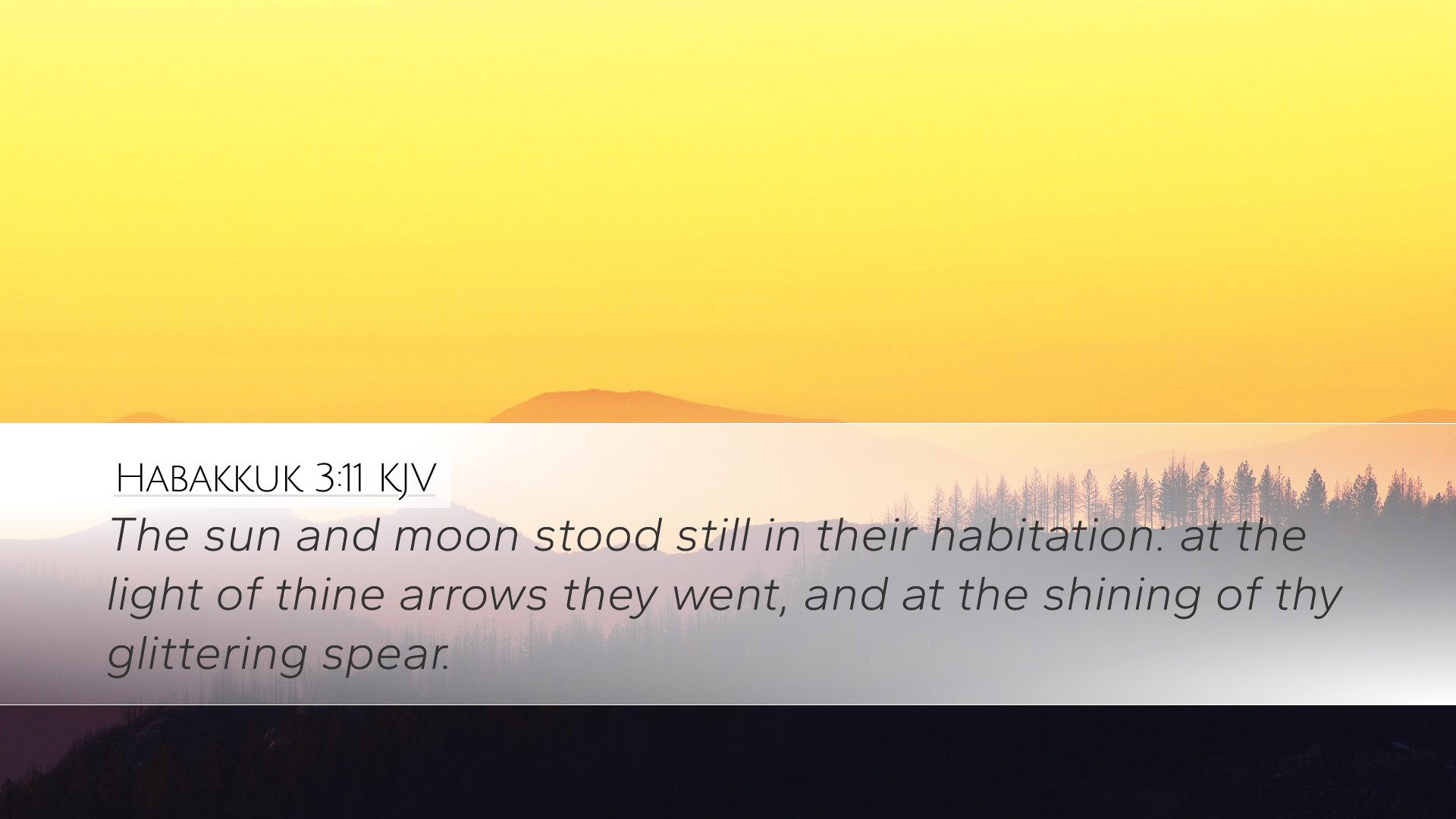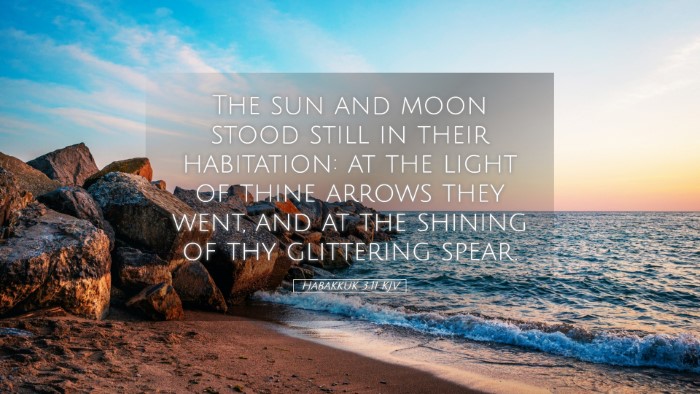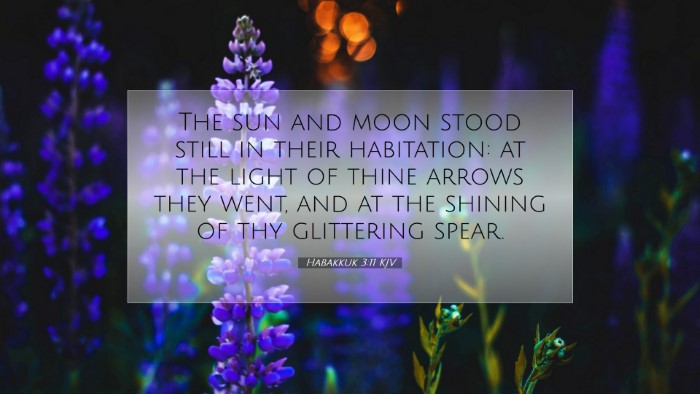Old Testament
Genesis Exodus Leviticus Numbers Deuteronomy Joshua Judges Ruth 1 Samuel 2 Samuel 1 Kings 2 Kings 1 Chronicles 2 Chronicles Ezra Nehemiah Esther Job Psalms Proverbs Ecclesiastes Song of Solomon Isaiah Jeremiah Lamentations Ezekiel Daniel Hosea Joel Amos Obadiah Jonah Micah Nahum Habakkuk Zephaniah Haggai Zechariah MalachiHabakkuk 3:11
Habakkuk 3:11 KJV
The sun and moon stood still in their habitation: at the light of thine arrows they went, and at the shining of thy glittering spear.
Habakkuk 3:11 Bible Commentary
Commentary on Habakkuk 3:11
Habakkuk 3:11 states: "The sun and moon stood still in their habitation: at the light of thine arrows they went, and at the shining of thy glittering spear." This verse is steeped in profound theological significance and rich imagery, capturing a moment of divine intervention that resonates throughout biblical history. Below is a synthesis of insights from noteworthy public domain commentaries.
Contextual Background
The book of Habakkuk is a unique dialogue between the prophet and God, centering on themes of justice, faith, and the sovereignty of God during tumultuous times. By chapter three, the dialogue transitions into a powerful prayer reflecting on God's majesty and the history of His mighty deeds.
Commentary Insights
This verse forms part of a vibrant poetic declaration and invokes a cosmic picture of divine power. It mainly focuses on God's authority over nature and His capacity to cause miraculous events.
-
Matthew Henry’s Commentary:
- Henry elaborates on the miraculous events associated with God's intervention in the natural order. He emphasizes the imagery of "the sun and moon standing still," a reference to God's sovereignty and the dramatic nature of His deliverance, reminiscent of Joshua's conquest in the battle at Gibeon (Joshua 10:12-14).
- This holds significance as it illustrates that the very elements obey the commandments of God, affirming His position as the Creator who controls both the heavens and the earth.
-
Albert Barnes’ Notes:
- Barnes elucidates the phrase "stood still" as indicative of a miraculous suspension of the natural order, underscoring God's omnipotence. The imagery brings to mind the mighty acts of God, particularly His help during Israel's battles, implying that time itself can be altered at His command.
- He draws attention to the arrows and glittering spear as metaphors illustrating God’s powerful judgments and the means by which He enacts His will upon the earth. It evokes a military metaphor where God is depicted as a warrior in battle, asserting His global supremacy.
-
Adam Clarke's Commentary:
- Clarke connects this verse directly to historical contexts while maintaining its poetic beauty. He emphasizes the "arrows" as symbols of God's judgment and the "glittering spear," which connotes power and prowess in the face of adversaries.
- He also notes the understanding of this passage among ancient cultures, highlighting that the literal stilling of celestial bodies would be perceived as a clear sign of divine intervention, thus instilling fear and reverence toward God’s glorified nature among nations.
Theological Reflections
From these diverse commentaries, a few crucial theological themes emerge:
-
God's Sovereignty:
The most prominent theme is the inherent sovereignty of God over creation. The imagery presented in Habakkuk 3:11 asserts that God holds ultimate power over all elements, offering reassurance to believers when facing uncertainties and adversities.
-
Divine Intervention:
This passage underlines the belief that God can and does intervene in the course of history. Such interventions serve not only to deliver His people but also to challenge and confront the wickedness present in the world.
-
Symbolism of Warfare:
The use of military imagery reflects both the battle against literal foes as well as the spiritual battles that believers face. This should encourage a sense of vigilance among Christians as they contend against forces of evil.
Application for Today
For pastors and theologians, Habakkuk 3:11 serves as a profound reminder of the nature of God as both a warrior and a benevolent protector. The powerful imagery invites believers to trust in God’s timing and authority, especially in moments of crisis.
-
Encouraging Faith:
In preaching, this verse can inspire believers to recognize the workings of God in their lives, reminding them of His ability to alter circumstances according to His divine plan.
-
Strengthening Hope:
The assurance that God is in control empowers believers to persevere through challenges while anchoring their faith in the midst of turmoil by contemplating God’s past interventions, both personally and biblically.
-
Engaging in Spiritual Warfare:
Moreover, the military imagery compels believers to be active participants in spiritual warfare, emphasizing prayer, intercession, and reliance on God’s strength to combat the forces of darkness.
Conclusion
In summary, Habakkuk 3:11 captures the essence of God's power over nature and time, reaffirming His sovereignty and the assurance He provides to His people. Drawing on the insights of Matthew Henry, Albert Barnes, and Adam Clarke underscores the timeless relevance of this verse. It serves as both a reminder and a rallying cry for faithfulness in the face of challenges, encouraging believers to reflect on the divine acts of intervention and the profound realities of spiritual conflict.


